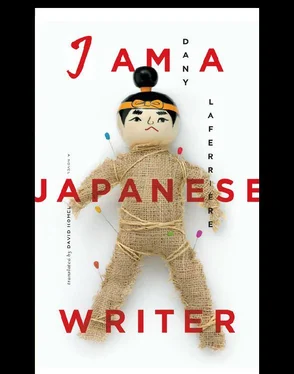Please understand, I was never obsessed with Mishima. As a teenager, I came across one of his novels at the back of some old cupboard along with a bottle of rum. I began with a long gulp of liquid fire. Then I opened the book ( The Sailor Who Fell from Grace with the Sea ) and a swarm of buzzing vowels and consonants flew into my face. They had been waiting forever for a visit. In a case like that, you don’t start classifying. You don’t look that gift horse in the mouth. Mishima’s book didn’t say to itself, “Well, well, here’s a good old Japanese reader.” And I didn’t look for a kindred spirit, recognizable colors or a shared sensibility. I dove into the universe that was set before me the way I dove into the little river not far from my house. I hardly even noticed his name, and it wasn’t until long afterward that I realized he was Japanese. At the time, I firmly believed that writers formed a lost tribe and spent their lives wandering the world and telling stories in all languages. That was their sentence for some unnameable crime. Hugo and Tolstoy were convicts. I found no other explanation for them having written those voluminous novels I devoured each night, in hiding. I imagined them with their feet in chains, seated next to an enormous inkwell carved out of rock. Which is why, later, I was reluctant to write thick books. I didn’t want to frighten children.
I don’t understand all the attention paid to a writer’s origins. Because, for me, Mishima was my neighbor. Very naturally, I repatriated the writers I read at the time. All of them: Flaubert, Goethe, Whitman, Shakespeare, Lope de Vega, Cervantes, Kipling, Senghor, Césaire, Roumain, Amado, Diderot — they all lived in my village. Otherwise, what were they doing in my room? Years later, when I became a writer and people asked me, “Are you a Haitian writer, a Caribbean writer or a Frenchlanguage writer?” I answered without hesitation: I take on my reader’s nationality. Which means that when a Japanese person reads me, I immediately become a Japanese writer.
I TAKE THE subway with Basho, The Narrow Road to the Interior . I once met Nicolas Bouvier, the translator of the French version, in Toronto. We drank a coffee together. He was so full of life yet so exhausted, both at the same time. His suitcase at the foot of the table. A quick dialogue between two airports— he was running off to New York. We talked about the Aztec upper classes, who underpaid their workers and forced them to labor at least twelve hours a day on monuments that today are covered over with grass. His taxi came. His face was tanned brown and sweating. Already his mind was on his notes. The taxi rushed off through the fine drizzle. The years passed. His legend grew out of all proportion. An intimate society made him into a kind of saint. Now he has returned as Basho’s translator. I’ll read a few scraps of Basho, but never a complete text. The poet relates his trip on foot to the northern reaches of Japan. I am reading him in the subway, following his adventures in search of the Shirakawa Barrier as the Montreal metro moves beneath the city. Everything is moving. Except time: that stands still. I’m too absorbed by all this telescoping of time and crisscrossing of space to get interested in my surroundings. Except for that girl across from me, looking at me, unsmiling. Long and thin. Dark eyes — a brushstroke. Her name must be Isa. As soon as someone enters my field of vision, she becomes a fictional character. No borders between literature and life. I return to my book. Basho is preparing his final journey with extreme care. He can no longer tolerate his stifling everyday existence. Time is passing too. “The fleeting transience of life, soon to die, yet no sign of it,” murmurs the vagabond poet, without bitterness. He must get back on the road again and renew his acquaintance with the zigzags of random chance: “Not yet dead, at journey’s end, autumn evening.” He abandons everything, even what is essential. He keeps only a sturdy paper overcoat for the cold nights, a straw cape for the rain and a cotton yukata. And since he is a writer, he slips into his bag a writing-board, ink and brushes. Even these indispensable things weigh upon him. Only the self is necessary, as naked as possible. I first discovered Basho’s poetry in a page of newsprint that had been used to wrap rice. Ever since, I have sought his trace in all things. In a bookstore, I always see if there is something by Basho or about Basho. The man possessed a true science of the emotions. And he was stubborn, too. Nothing forced him to undertake a journey like that at his age, but no one could stop him once he had made the decision to go. Sora accompanied him, to free him of domestic tasks.
They set out at dawn. The next time we see him, he is in the Nasu swamplands. Rain forces them to pass the night in a thatched hut. Basho seems in fine shape. Movement is his element. He moves as the landscape changes.
I am in the Montreal subway, following the footsteps of a certain Matsuo Munefusa, also known as Basho. He was born in 1644 in Tsuge, a village close to Ueno. He admired the poet Tu Fu. Basho and Sora reached the prestigious Shirakawa Barrier, which all the old poets spoke of with great emotion. No sooner had they crossed the Abukuma River than they discovered, on the left, “the summit of Mount Bandai, whose vast height dominates the land of Aizu.” They paused at the house of a hermit who lived under a chestnut tree. Basho composed a haiku about the chestnut tree, which seemed to him more moving than the hermit. He no doubt recalled the banana tree that gave him his name: basho. The rains lasted the entire month of June.
I look up. Isa is still there. Nothing has moved but the train. I go back to Basho. Matsushima! Our travelers have long dreamed of it. Finally they are there. They head for the beach at Ojima. Matsushima leaves Basho speechless. There are islands everywhere. Everything is graceful, especially the pine trees, “dense, green and dark,” whose elegance he sings. Death caresses him near the Kitakami River, where the Koromo joins it.
The journey became ever more arduous. Thickets of bamboo, rushing streams, rocks, and, worst of all, the cold sweat along the steep path that led to the Mogami district. The two poets rested before resuming their journey. They hoped to travel down the Mogami by boat. The weather was so bad they had to wait days before taking to the road again. Peasants recognized Basho and asked him to give them writing lessons. He was moved: “Who would have thought that, during this pilgrimage dedicated to those who have gone before me, I would have the opportunity to teach my own style, and in such surroundings?” What delicacy of spirit! And here was the Mogami, whose source is the northern highlands.
Basho was always ready to point out the places along the way so that other poets might make the same journey. This is the great game we have been playing for centuries. Basho tried to show us that all poets are as one, that the same spirit moves through them. The road is the same for all, though each poet travels it in his own way. And in his own time. The train has stopped without me realizing it. Just time enough to see Isa, from behind, in the crowd of hurried travelers. Her long fragile neck. Its sad nape (I project my sadness onto her nape). The train starts moving again.
THE KISS AT THE CAFÉ SARAJEVO
I HADN’T HEARD of the Café Sarajevo, even though it’s centrally located, not far from the subway station. I prefer the subway to the bus. In the subway, you see only faces. In the bus, only landscapes. I emerge from the hole, turn left, walk into the café. Good atmosphere. Every city has at least one place like this. Anyone who has listened to Joan Baez ends up here, sooner or later. The kind of people who’ve dropped off our radar, though we wonder where they’re hiding out. They end up in cafés like the Sarajevo. I haven’t come expecting to find Joan Baez here. Or even Suzanne Vega. The wheel has turned. I’ve come for Midori, the new Japanese singer who’s on MuchMusic from time to time. I’d never heard of her, either, but ever since the Korean told me about her, I’ve seen her everywhere. You don’t know Midori? There are posters of her in the bathrooms in bars. It’s hard to tell what she really looks like from them because she’s underwater and her face is slightly deformed. She’s holding her breath. The photographer waited till the last second. Just as she was about to explode. Her eyes wide with the beginnings of terror. The pink wings of her nose diaphanous. Her throat swelling. Click. Her torso bursts free of the water. Water pouring from her mouth, her nose, her eyes. Her name is whispered all over town: Midori. In every tongue. Montreal’s first Japanese star. The rocket Midori is launched: destination, Planet Bjork. Bjork— a muffled sound. A sound in water. Basho notes:
Читать дальше












